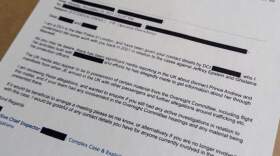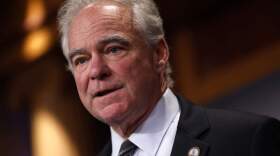NOEL KING, HOST:
It has been a messy debate season so far. President Trump has coronavirus but says he's looking forward to his debate with Joe Biden next week. Biden says he feels differently.
(SOUNDBITE OF ARCHIVED RECORDING)
JOE BIDEN: I think if he still has COVID, we shouldn't have a debate. I think we're going to have to follow very strict guidelines. Too many people have been infected.
KING: Now, meanwhile, tonight, the vice presidential candidates will debate for the first and only time in Salt Lake City. Vice President Mike Pence's team now says it will allow a plexiglass barrier between him and Sen. Kamala Harris while they're on the stage. Pence's people had dismissed that idea at first.
NPR national political correspondent Mara Liasson will be watching. Good morning, Mara.
MARA LIASSON, BYLINE: Hi, Noel.
KING: That first debate was just before the president was diagnosed with COVID. He may have, in fact, been infected when it took place. How does that change what we'll see tonight?
LIASSON: Well, certainly there'll be more safety precautions. The two candidates, Pence and Harris, will be seated - that's traditional - but they're going to be further apart than they might've been before the president got sick. There also is going to be a plexiglass barrier between them. The Trump administration didn't want that, but the decision is up to the commission. And last night, a Pence aide said that the vice president, quote, "won't let a barrier get in the way of the debate."
KING: OK. And...
LIASSON: And I should say Pence and Harris both have tested negative.
KING: In recent days, yes, they've been...
LIASSON: Yes.
KING: ...Sort of letting us know daily. Do you think that Pence and Harris will talk much tonight about the president's diagnosis?
LIASSON: I think that it's unavoidable. COVID and the president's handling of the pandemic has become the No. 1 issue in the campaign, especially now that the president is sick. And also, a whole cluster of White House aides, including - Stephen Miller is the latest White House aide to report that he has it, too.
I think that Democrats are going to argue, Kamala Harris will argue that he couldn't even keep himself safe; how can the president keep your family safe or the country safe? I think you can expect Vice President Pence to carry the latest White House message that it's not so bad, it's just like the flu - even though that's not true - the president is beating this, and Biden would shut down the whole economy.
I think the big opportunity for Harris on the pandemic is not only is Pence a proxy for the president, and she'll try to hold him responsible for every unpopular thing the administration has done, but Pence is also the actual head of the COVID task force, so he has official responsibility for how things have gone.
KING: And then after the first debate, there was all of this criticism that the American people really didn't get to hear that much about policy, about what these candidates would do with and for the country. What does Mike Pence need to say tonight?
LIASSON: Well, I think one of Mike Pence's jobs is to do cleanup from Trump's first debate performance, where he interrupted Biden and the moderator repeatedly. He got bad marks from voters for it. But there's no better antidote to Trump's over-the-top performance than Mike Pence. Mike Pence is smooth and steady and disciplined. As a conservative radio host before he was in politics, he called himself Rush Limbaugh on decaf. And he's very experienced and effective debater. He won the 2016 debate with Tim Kaine.
He does have a choice tonight. He could attack Biden through Harris, or he could try to make Harris into the liberal puppeteer controlling Biden, to say that she'd be the real president because Biden is so old. But there's a risk there, too. He can't be too aggressive going after her 'cause he could risk turning off even more suburban women.
KING: And so what does Kamala Harris need to get done tonight?
LIASSON: Well, Kamala Harris has had much less experience debating one-on-one. Her strengths are at Senate hearings, where she's questioning a witness. That's very different than a back-and-forth debate. Sometimes she's been wobbly on policy in debates. So I think you'd have to say on points, she's the underdog tonight, but her job is much more straightforward. Make Pence defend every unpopular thing that Trump has done.
She also has a risk tonight. She has that double bind as a woman and a woman of color. Remember; she has to be strong. She has to be likable. She can't be too aggressive. She can't be too angry. So both of these candidates have opportunities and risks.
KING: Vice presidential debates are often considered not so big a deal. That would seem to be very different this year.
LIASSON: I think this is a bigger deal because the president is sick. And both Trump and Biden are in their 70s, so either Harris or Pence could be president sooner than you think, depending on who wins.
KING: NPR's Mara Liasson. Thanks so much, Mara.
LIASSON: Thank you. Transcript provided by NPR, Copyright NPR.






